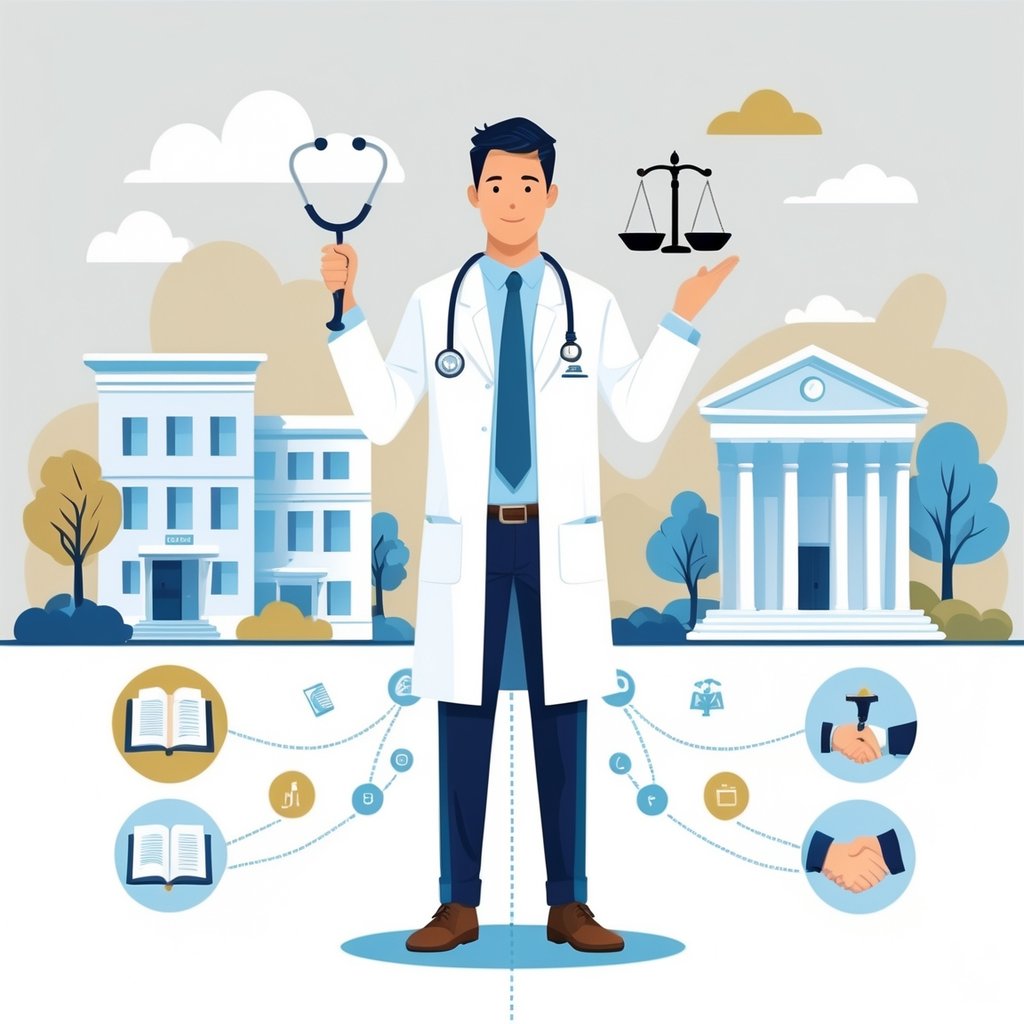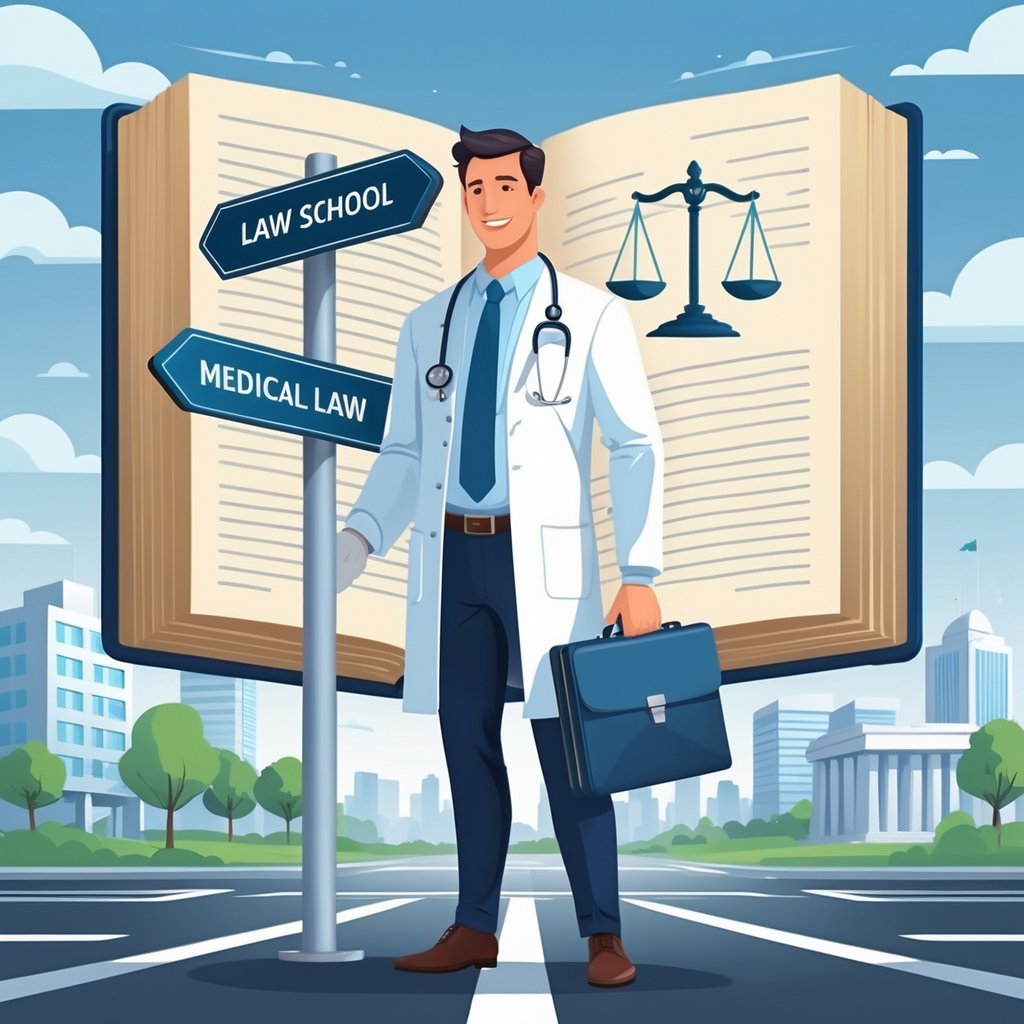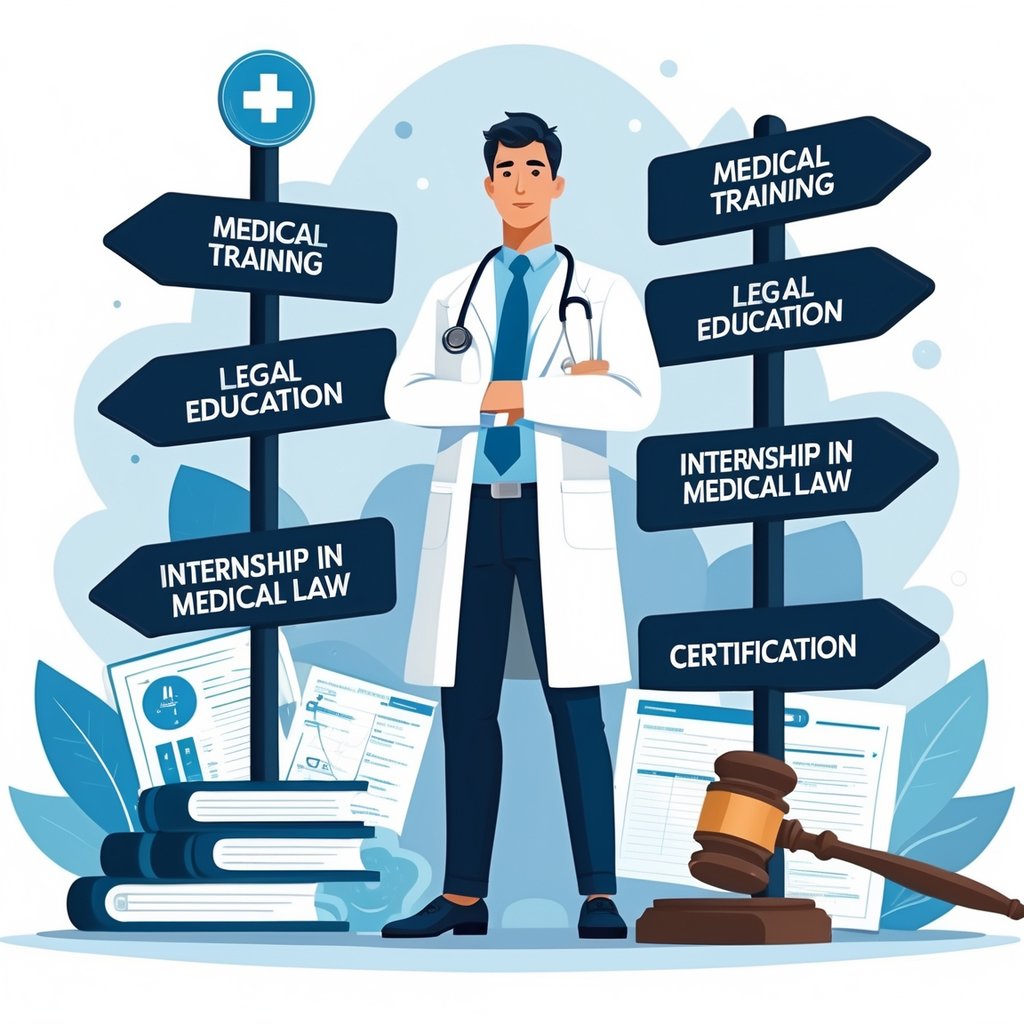Many doctors feel drawn to the legal side of healthcare. Some want to diversify their income, take on new challenges, or leave clinical practice behind.
You can break into medical law as a doctor without a full law degree if you start with medico-legal jobs that use your medical expertise. Traditional legal practice, though, still means law school and passing the bar exam.

The path you pick depends on your goals and experience. Medico-legal work gives doctors options like defending clinical negligence claims or serving as expert witnesses.
Your medical background gives you a real edge in either direction.
Knowing your options early helps you make better choices about time, education, and career changes. The field opens up different entry points if you want to supplement your medical career or move fully into law.
Key Takeaways
- Medical professionals can pursue medico-legal careers without law degrees or go all-in for a legal career as healthcare attorneys
- Entry-level jobs exist for doctors with little legal experience, while senior roles need more clinical background and extra qualifications
- Career paths include NHS trust legal teams and expert witness work, with pay and requirements changing by specialty
Understanding Medical Law and Its Relevance for Doctors

Medical law sets the rules for healthcare practice, patient rights, and professional duties. Doctors with medical degrees have unique advantages when moving into legal careers focused on healthcare regulation, malpractice, or biomedical issues.
What Is Medical Law?
Medical law covers the legal rules that shape healthcare delivery, patient care, and medical practice. This field includes patient rights, informed consent, privacy, and liability for healthcare providers.
Key areas include:
- Medical malpractice: Claims against healthcare providers
- Healthcare law: Rules for medical institutions
- Biomedical law: Legal issues in research and biotechnology
- Public health law: Population health rules and policies
Medical law shapes professional duties, patient consent, malpractice liability, and privacy rules for all healthcare workers. It sets standards that protect both patients and practitioners.
Healthcare law also deals with regulatory compliance, licensing, and quality standards. These rules keep facilities operating legally and protect patient safety.
Benefits of a Medical Background in Law
A medical degree gives you a solid advantage in law and health sciences. You already know clinical procedures, medical terms, and care standards—stuff most lawyers have to learn from scratch.
Clinical Knowledge Advantage
- You can review medical records accurately.
- You get diagnostic procedures and treatments.
- You know medical equipment and drugs.
- You understand hospital routines and protocols.
This background lets you judge medical malpractice cases more effectively. You spot when care slips below standards and can handle complex medical evidence.
Your experience with patient care gives you insight into doctor-patient relationships. That’s useful for cases involving consent, rights, or ethics.
You know how hospitals and clinics really work. That’s gold for healthcare law.
Common Roles For Doctors in Law
Doctors can blend clinical know-how with legal work in several ways. These jobs use your background while shifting the focus to health law.
Medical Malpractice Attorney
- Represent patients or defend providers
- Analyze records and expert testimony
- Negotiate settlements in negligence cases
Healthcare Compliance Officer
- Make sure facilities follow rules
- Develop policies for legal requirements
- Lead audits and staff training
Medical legal consultants help attorneys understand healthcare, offering insights into medical practices and care standards.
Regulatory Affairs Specialist
- Guide FDA approval for devices
- Ensure pharma compliance with federal law
- Advise on research regulations
Insurance Medical Director
- Review claims for necessity
- Develop coverage policies
- Handle appeals and utilization management
Some of these roles need extra legal training, but your medical background sets you up for success in health law.
Key Steps to Transition From Medicine to Law

Switching from medicine to law takes planning and an honest look at your goals. Think about what you want from this change, and decide if you’ll pursue degrees together or one after the other.
Self-Assessment and Setting Career Goals
Before jumping in, ask yourself why you want to be a medical lawyer. Are you interested in policy, malpractice, or pharma regulation?
Ask yourself:
- Do you like analyzing complex rules?
- Are you okay with less direct patient contact?
- Can you handle the competition in law?
Your medical background helps you understand scientific evidence and healthcare systems. Try shadowing medical law specialists to see what the work is really like.
Money matters. Law school usually costs $50,000 to $70,000 a year, and you’ll lose income while in school.
Set clear goals like “work in FDA regulatory law” instead of vague ones. That focus helps with law school applications and networking.
Evaluating Joint or Sequential Degree Paths
You’ve got a few routes for getting your law degree after med school. Each one has pros and cons depending on your timeline and goals.
Sequential Path: Finish your bachelor’s, then do a three-year Juris Doctor. Most medical lawyers take this route.
Joint JD/MD Programs: Some schools offer combined programs, but they take six or seven years. These work if you want to practice both fields.
Master of Laws (LLM): This is a one-year degree for specialization, but you still need a JD to practice law in most places.
The SQE pathway in England and Wales offers more flexibility. You can get legal work experience while studying.
Think about your debt and family before choosing. The sequential route often gives you more chances for networking and internships.
Education and Admission Requirements

Doctors moving into medical law need specific academic prep and must meet standard law school requirements. The LSAT is still the main entrance exam, but some schools now take the GRE.
Choosing the Right Pre-Law Courses for Doctors
Your medical background is already strong, but extra coursework can improve your law school application. Pick classes that boost critical thinking and writing.
Recommended Pre-Law Courses:
- Constitutional Law
- Business Ethics
- Healthcare Policy
- Medical Ethics
- Statistics and Research Methods
English composition and philosophy help with analytical writing. Political science introduces legal concepts and government basics.
You already know anatomy, physiology, and healthcare systems. That knowledge applies directly to malpractice and healthcare regulation cases.
Try audit courses if you’re short on time. Law schools value diverse backgrounds, so your medical training stands out.
Law School Admission Test (LSAT) and GRE Overview
The LSAT tests reading, logic, and analytical writing. Most law schools want this exam.
LSAT Structure:
- Reading Comprehension: 1 section
- Logical Reasoning: 2 sections
- Analytical Reasoning: 1 section
- Writing Sample: 1 section
The whole thing takes about three and a half hours. Scores run from 120 to 180, with 150 being average.
Some healthcare law programs take the GRE instead. The GRE checks verbal, quantitative, and writing skills.
Your medical training helps with logical reasoning. The scientific method teaches you to test hypotheses and weigh evidence, which the LSAT also looks for.
Plan to study for three to six months. Use timed practice tests to build stamina and spot weak spots.
Applying to and Selecting Law Schools
Your law school application needs transcripts, LSAT scores, recommendations, and a personal statement. Apply to each school separately.
Application Components:
- Undergraduate transcripts
- LSAT or GRE scores
- Personal statement
- Letters of recommendation
- Resume
Look for schools with strong healthcare law. Check for faculty with expertise in malpractice, FDA regulation, or healthcare policy.
Location matters. Being near medical centers or healthcare companies helps with internships. Some schools offer joint MD/JD programs.
Use your personal statement to explain why you want to blend medicine and law. Show off your medical experience and legal interests.
Apply to several schools to boost your chances. Admission is competitive, with top programs wanting LSAT scores from 155 to 170.
Navigating Law School as a Physician

Law school gives physicians a chance to build on their medical knowledge with specialized programs and new skills. Picking the right concentration and learning core legal skills can set you up for success in law.
Relevant Law School Concentrations and Dual Degree Programs
Many law schools offer health law training that builds on your medical background. These programs focus on healthcare regulations, malpractice, and bioethics.
Health Law Concentrations might include:
- Healthcare compliance and regulations
- Medical malpractice litigation
- Bioethics and patient rights
- Healthcare policy development
Some schools have dual degree programs that combine your medical degree with legal education. These blend medical and legal training efficiently.
Popular combos include:
- JD/MPH (Master of Public Health)
- JD/MS in Health Administration
- Law and health sciences programs
A Master of Laws (LL.M.) in health law gives extra specialization after your JD. This credential can deepen your expertise in tricky medical-legal issues.
Core Legal Skills for Doctors Entering Law
Your medical training gives you strong analytical skills, but law school means picking up new legal abilities.
Legal Research and Writing is the foundation. You’ll need to:
- Navigate legal databases and case law
- Write briefs and memos
- Analyze statutes and regulations
- Cite legal sources properly
Legal research isn’t the same as medical research. You’ll need to master Boolean searches, understand court hierarchies, and trace precedents.
Critical thinking in law is more about argument and advocacy than diagnosis. You’ll work on:
- Building persuasive arguments
- Spotting counterarguments
- Applying legal precedents to new cases
Contract analysis and tort law matter for medical professionals. These areas tie directly to malpractice, healthcare contracts, and regulatory compliance.
Specialization Pathways in Medical Law

Medical law gives doctors four main ways to specialize, each using clinical experience to tackle legal challenges in healthcare. These paths include defending malpractice claims, shaping policy, and working through bioethical dilemmas.
Medical Malpractice and Negligence Law
Medical malpractice law centers on cases where healthcare providers are accused of failing to meet care standards. As a doctor in this field, your clinical insight lets you evaluate if treatment choices made sense.
Your background helps you spot when care slips from accepted practices. Some become defense attorneys for providers, others work for patients who were harmed.
Key responsibilities include:
- Reviewing medical records for standard of care violations
- Working with medical experts to build cases
You’ll also need to understand informed consent requirements and analyze links between negligence and patient harm. This work calls for a deep grasp of medical malpractice law and the ability to explain medical ideas to judges and juries.
Most cases involve emergency medicine, surgery, obstetrics, or diagnostic errors. Expect to spend hours deposing providers, reviewing imaging, and digging through medical literature.
Health Policy, Reform, and Public Health Law
Health policy law means creating and enforcing rules for healthcare delivery. Medical training gives you a real sense of how these rules impact patient care and provider routines.
This area covers healthcare reform, insurance regulation, and public health emergencies. You could work for government, healthcare systems, or consulting firms.
Major focus areas include:
- Medicare and Medicaid regulations
- Affordable Care Act compliance
You might also handle public health emergency powers and healthcare quality measures. Public health law deals with issues like disease surveillance, vaccine mandates, and environmental standards.
Your clinical experience helps you see how rules play out in real life. Healthcare reform law also means looking at payment systems and delivery models.
You’ll draft regulations, give compliance advice, and represent organizations before regulators. It’s a field where you need to know both medicine and the maze of regulations.
Contract Law and Healthcare Transactions
Healthcare contract law handles agreements among providers, insurers, suppliers, and patients. Medical knowledge helps you understand what these deals mean for everyday care.
You might negotiate physician contracts, hospital mergers, or vendor deals for devices and drugs. Knowing clinical workflows and medical lingo helps a lot here.
Common contract types include:
- Physician employment and partnership agreements
- Hospital-physician service agreements
You’ll also see medical device and supply contracts, plus real estate deals for clinics and hospitals. Contract law in healthcare means balancing business goals with patient care duties.
You’ll check for compliance with anti-kickback statutes and stark law rules. Healthcare transactions cover mergers, acquisitions, and joint ventures.
Your clinical background helps you judge if deals will help or hurt patient care. You might also work on intellectual property agreements for new medical tech.
Bioethics and Biomedical Law
Bioethics and biomedical law dig into the moral and legal questions that come with new medical advances. Clinical training gives you the context to weigh tough ethical calls.
This field covers end-of-life care, reproductive medicine, genetic testing, and human research. You’ll help organizations build policies that balance innovation and patient safety.
Key practice areas include:
- Clinical research regulations and IRB compliance
- Genetic privacy and discrimination issues
You might also handle organ transplantation policies and medical AI liability. Bioethics work often means consulting on tricky cases—like pulling life support or treating minors against a parent’s wishes.
Biomedical law includes regulating devices, drugs, and biotech. Knowing how these products work in real care helps you assess safety claims.
You’ll work with FDA rules on clinical trials and device approvals. The field changes fast, so you’ll need to keep up with new tech and shifting laws.
Licensure and Practice Essentials

Doctors moving into medical law face both bar exam prep and ongoing credential upkeep. Every state has its own legal requirements, so you’ll juggle your medical license with new legal duties.
Preparing for the Bar Exam
Most people need 6 to 8 weeks of full-time study for the bar. You’ll review constitutional law, contracts, torts, and civil procedure.
Medical knowledge helps with health law questions and medical malpractice cases. You’ll be better at interpreting medical records.
A lot of doctors use bar prep courses like Barbri or Themis. These cost $2,000 to $4,000 and give you a structured plan.
Key study areas include:
- Evidence rules for medical cases
- Professional liability standards
You’ll also cover healthcare regulations and patient privacy laws. Do multiple-choice questions every day.
The Multistate Bar Examination (MBE) is half of most state bar exams. Set aside time for essay practice, since many states include local healthcare law.
State Bar Exams and Jurisdictional Requirements
Each state controls its own legal licensing. You have to pass the bar wherever you want to practice.
The Uniform Bar Examination (UBE) lets you transfer scores across 41 states, which saves time if you plan to move or work in more than one place.
UBE scores transfer to these states:
- New York (minimum score 266)
- California (minimum score 269)
- Texas (minimum score 270)
- Illinois (minimum score 266)
Some states require extra exams. For example, California has its own bar starting in 2024.
Character and fitness reviews usually take a few months. They’ll look at your medical license history.
You need to disclose any medical board actions or malpractice claims. Most states are fine with doctors who have clean records.
Maintaining Medical and Legal Credentials
Both licenses need continuing education credits. Expect 12 to 15 CLE hours per year for law, and 20 to 40 CME hours for medicine.
Legal CLE requirements by state:
| State | Annual Hours | Ethics Hours |
|---|---|---|
| New York | 24 | 4 |
| California | 25 | 4 |
| Texas | 15 | 3 |
Your medical license adds to your legal credibility. Keep both active, even if you mostly practice law.
State medical boards have specific licensing requirements that vary. Some need exam updates or minimum practice hours.
Legal malpractice insurance runs $1,000 to $3,000 a year. You might still need medical malpractice insurance if you consult on cases.
Joining both medical and legal groups helps. The American Health Law Association is a good bridge between the two.
Career Opportunities and Work Environments for Doctor-Lawyers

Doctor-lawyers work in all sorts of places, from law firms handling malpractice to government agencies shaping healthcare policy. Hospitals, insurance companies, and universities also value this combined skill set.
Working With Law Firms and Legal Departments
Many law firms want doctor-lawyers on their medical litigation teams. You’ll work on malpractice cases, personal injury claims, and drug lawsuits where your clinical background is a big plus.
Medical lawyers who work in law often serve as expert witnesses. You’ll review records, analyze care standards, and testify in court.
Pharmaceutical and device companies also hire doctor-lawyers. You’ll check regulatory compliance, assess product risks, and help with FDA processes.
Key Responsibilities:
- Case analysis and expert testimony
- Medical record review
You’ll also guide on regulatory compliance and consult clients on healthcare matters. Medical training lets you spot issues others miss and explain complex ideas to judges and juries.
Roles in Hospitals, Insurance Companies, and Government Agencies
Hospitals employ doctor-lawyers for risk management and compliance. You’ll work with providers to reduce legal risks and meet regulations.
Insurance companies lean on your expertise for claims review and policy work. You’ll decide medical necessity, investigate fraud, and handle coverage disputes.
Government agencies like Health and Human Services need doctor-lawyers for enforcement. You’ll help write policies, investigate violations, and oversee compliance.
Common Positions:
- Hospital risk manager
- Insurance medical director
You might also be a regulatory compliance officer or healthcare policy analyst. Clinical experience helps you see how legal choices affect real care.
Academic, Consulting, and Policy Careers
Universities hire doctor-lawyers as professors or researchers. You can teach health law, do research, and mentor dual-degree students.
Healthcare consulting careers offer variety. You’ll advise organizations on mergers, acquisitions, and compliance.
Policy groups and think tanks want doctor-lawyers to analyze healthcare laws. You’ll weigh both the medical and legal sides of new rules.
Career Options:
- Law school professor
- Healthcare policy researcher
You could also be an independent consultant or medical ethics advisor. With your background, you’re set up for areas like telemedicine, AI, and precision medicine.
Salary Expectations and Career Outlook
Medical lawyers earn strong salaries that reflect their specialized skills. Pay varies a lot depending on job setting and location, but the field is growing as healthcare law gets more complicated.
Typical Compensation for Medical Lawyers
Your pay as a medical lawyer depends on experience, location, and job type. Medical lawyers can earn up to $180K+ in some roles.
Entry-level jobs usually start around $80,000 to $120,000. With a few years in, many make $120,000 to $160,000.
Location matters for salary:
- Missouri: $99,319 annually
- Delaware: $96,873 annually
Big cities usually pay 15 to 25 percent above the national average. Private law firms offer the highest salaries, especially for partners.
In-house jobs at hospitals or drug companies pay well and have good benefits. Government jobs pay less but offer solid benefits too.
Experience level breakdown:
- 1 to 3 years: $80,000 to $120,000
- 4 to 7 years: $120,000 to $160,000
- 8+ years: $160,000 to $250,000+
Emerging Trends in Medical Law
Healthcare law is changing fast, and legal jobs in this space are growing. Telemedicine has brought new compliance problems that medical lawyers need to solve.
Key growth areas include:
- Data privacy and cybersecurity: HIPAA for digital health
- AI regulation: Rules for AI-powered medical devices
Value-based care contracts are another hot topic. Biotech and pharma law are both expanding with gene therapy and personalized medicine creating legal challenges.
Mental health parity laws are also driving demand for lawyers who understand behavioral health coverage. Insurance disputes in this space need expert advice.
Employment projections show:
- 10 to 15 percent job growth over the next decade
- More jobs in rural healthcare
- Rising demand for compliance specialists
Medical lawyers with tech backgrounds earn premium salaries. Dual expertise in medicine and law puts you in a strong spot for these new opportunities.
Remote work has become more common, letting you serve clients nationwide while keeping pay competitive.
Frequently Asked Questions
Doctors moving into medical law need extra education and legal certification beyond their medical degree. The shift means picking up new skills while using your medical background to succeed in litigation, compliance, and advocacy.
What educational path is required for a doctor to transition into medical law?
You need a Juris Doctor degree from an accredited law school. This usually takes about three years of full-time study after finishing your medical degree.
Law schools want you to take the LSAT or GRE before they’ll consider your application. Having a medical background really helps you make sense of complicated healthcare cases.
Some law schools offer health law programs or specific concentrations. These focus on things like medical malpractice, healthcare regulations, and patient rights.
Are there specific legal certifications or degrees that a practicing physician must obtain to work in the field of medical law?
You have to pass the bar exam in your state if you want to practice law. This rule stands even if you already have a medical degree.
A lot of medical lawyers go for a Master of Laws (LL.M.) degree in health care law. This advanced program digs deeper into healthcare regulations and medical ethics.
Some states have board certification in health law through their bar associations. These certifications help show your expertise to employers and clients.
What are the key skills and competencies needed for a doctor to succeed in the medical legal profession?
You’ll need sharp analytical and research skills to review medical records and case law. Medical training makes it easier to understand complicated terminology and procedures.
Communication matters a lot. You have to explain medical ideas to judges and juries who don’t have a medical background.
It’s important to pay close attention to detail when handling medical malpractice cases. You need to spot where care went off track and document it clearly.
How can a medical doctor gain experience in legal matters relevant to the healthcare industry?
Start by getting involved in medical malpractice reviews at your hospital. This helps you see how legal standards fit into daily medical care.
Serving on hospital ethics committees or quality assurance boards gives you exposure to compliance and regulatory issues. These roles can be surprisingly eye-opening.
During law school, try internships or clerkships with firms that handle medical malpractice cases. This kind of hands-on experience really matters.
You might also work as a medical expert witness while you’re finishing law school. It’s a good way to connect your medical knowledge with the legal world.
What are the typical career opportunities available for physicians in the medical law sector?
You could join law firms that handle medical malpractice defense or represent plaintiffs. Your medical background makes you a real asset in tough healthcare cases.
Some doctors go into government work, like health departments or regulatory agencies. These jobs involve policy and making sure organizations follow the rules.
Insurance companies look for physician-lawyers to review claims and figure out liability. This role blends medical know-how with legal thinking.
Corporate healthcare organizations hire lawyers for compliance and risk management. Your background in both fields helps them handle tricky regulations.
How does a background in medicine enhance a legal career focused on healthcare law and patient advocacy?
Medical training gives you a real grasp of clinical practices and standards of care. You spot potential malpractice issues that other lawyers might overlook.
You speak the language of medical professionals and get where they’re coming from. This skill makes a difference during depositions and when working with expert witnesses.
Juries tend to trust physicians more when it comes to medical testimony. Your credibility goes up when you talk about medical issues in court.
You also understand what injured patients and their families go through, both emotionally and physically. That empathy helps you stand up for them in ways that really matter.










